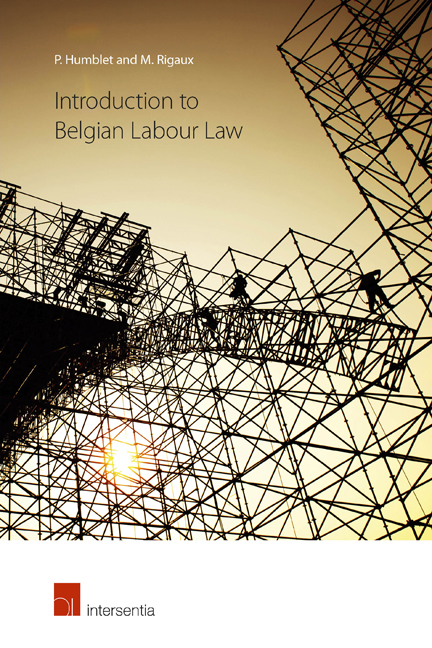Book contents
- Frontmatter
- Preface
- Contents
- List of Abbreviations
- PART I EMPLOYMENT LAW
- I THE CONTRACT OF EMPLOYMENT
- II CONCLUDING THE CONTRACT
- III EMPLOYMENT
- IV TERMINATION OF EMPLOYMENT
- V SPECIAL AND DEVIATING TYPES OF EMPLOYMENT CONTRACTS
- PART II INDUSTRIAL RELATIONS LAW
- I FREEDOM OF ASSOCIATION
- II TRADE UNIONS AND EMPLOYERS’ ASSOCIATIONS
- III INSTRUMENTS FOR SOCIAL DIALOGUE
- IV FUNDS FOR SOCIAL SECURITY
- V INDUSTRIAL ACTION
- Chapter 1 Strikes, Lock-outs and Factory Occupation
- Chapter 2 Settlement of Industrial Conflicts by Mediation and Conciliation
- Chapter 3 Regulations for Settling Industrial Disputes
- Chapter 4 Settlement of Industrial Disputes by the Courts
- In Cauda
- General Bibliography
- E-addresses
Chapter 1 - Strikes, Lock-outs and Factory Occupation
from V - INDUSTRIAL ACTION
Published online by Cambridge University Press: 13 December 2017
- Frontmatter
- Preface
- Contents
- List of Abbreviations
- PART I EMPLOYMENT LAW
- I THE CONTRACT OF EMPLOYMENT
- II CONCLUDING THE CONTRACT
- III EMPLOYMENT
- IV TERMINATION OF EMPLOYMENT
- V SPECIAL AND DEVIATING TYPES OF EMPLOYMENT CONTRACTS
- PART II INDUSTRIAL RELATIONS LAW
- I FREEDOM OF ASSOCIATION
- II TRADE UNIONS AND EMPLOYERS’ ASSOCIATIONS
- III INSTRUMENTS FOR SOCIAL DIALOGUE
- IV FUNDS FOR SOCIAL SECURITY
- V INDUSTRIAL ACTION
- Chapter 1 Strikes, Lock-outs and Factory Occupation
- Chapter 2 Settlement of Industrial Conflicts by Mediation and Conciliation
- Chapter 3 Regulations for Settling Industrial Disputes
- Chapter 4 Settlement of Industrial Disputes by the Courts
- In Cauda
- General Bibliography
- E-addresses
Summary
SECTION 1. STRIKES
Article 1 of the Essential Services Act describes a ‘strike’ as a ‘collective and temporary decision of workers to stop working’. This implies that:
– employees temporarily cease to fulfil their contractual obligation to work. A partial or alternative resumption does not suffice;
– strikes are collective. A one-man strike does not constitute a strike (unless the enterprise has only one employee);
– the cessation of work is only temporary. Strikers go back to work when the strike has ended; and
– a striker is a person who has ceased his/her contractual obligations. Members on a picket line are therefore not necessarily strikers.
Case law and doctrine often refer to the definition given in the Dictionary of Social Legislation: ‘A voluntary and un-coerced decision taken by all or a group of workers to deliberately stop working temporarily as a means of achieving a specific objective.’ As this text never became legally binding, its definition is indicative only.
Strikes can be subdivided according to their:
– objective: professional strikes, solidarity strikes and political strikes;
– origin: regular strikes, spontaneous strikes and wildcat strikes; and
– the methods used: ‘ordinary’ strikes, work-to-rule strikes, lightning strikes, selective strikes, plant occupations, boycotts, go-slow strikes, etc.
In the past, the type of strike used affected the courts’ view of collective action. However, the Court of Cassation ended this situation with its principle ruling of 21 December 1981.
LEGAL POSITION
Before the Act of 24 May 1921, it was considered a criminal offence to organise and participate in a strike. Although the sanction under public law was repealed by the 1921 Act, striking remained an offence under civil law.
Initially, participating in a strike was considered to be a breach of contract, but not serious enough to warrant a unilateral termination of the contract of employment. Strikers were often dismissed for just cause. The answer to the question of whether or not all forms of professional collaboration had become impossible depended on the nature of the work stoppage. Regular strikes (i.e. recognised by the representative unions and respecting the obligation of social peace and the conciliation procedure) were considered legal. Taking part in such actions did not justify dismissal for just cause. Spontaneous strikes (i.e. recognised by the representative unions, but not respecting the social peace obligation and conciliation procedure) were often regarded as unlawful.
- Type
- Chapter
- Information
- Introduction to Belgian Labour Law , pp. 249 - 254Publisher: IntersentiaPrint publication year: 2016



